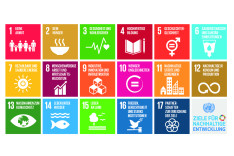G20 resource efficiency
Finding a global response to global issues
During its G20 Presidency, Germany is pushing strongly for a dialogue on the sustainable use of natural resources. The Resource Efficiency: Potential and Economic Implications report published this month by the UN International Resource Panel indicates how resources can be used efficiently at every stage of the economic process.
 Recycling resources:mobile phones contain valuble metals
Photo: mauritius images
Recycling resources:mobile phones contain valuble metals
Photo: mauritius images
"Our prosperity must not be dependent on the increasingly intensive use of natural resources. Growth and consumption of resources are still too closely coupled worldwide," warned Federal Environment Minister Barbara Hendricks at the opening of the high-level international conference in Berlin.
Preparations for the G20 summit in Hamburg
The sustainable use of natural resources is now on the agenda of a G20 summit for the first time ever. Germany is using its G20 Presidency to step up cooperation with G20 partners in the field of resource efficiency, making this issue a high-profile object of an international inter-governmental process. Together the G20 states are responsible for the vast majority of both the world’s energy consumption and CO2 emissions.
To give the efforts to boost resource efficiency a more prominent place in the international discussion, the German government has proposed founding a G20 resource partnership. "The global challenges call for a global response. We need a strong partnership that brings together all major economic powers, so that we do not further exceed the limits of our planet," pointed out Barbara Hendricks. Many states are interested in sharing information about best practices and innovative technology that can help improve resource efficiency, she added.
The G20 preparatory conference was attended by delegations from international organisations including the Organisation for Economic Co-operation and Development (OECD), UN Environment and the United Nations Industrial Development Organization (UNIDO), as well as all G20 states. Ibrahim Thiaw (UN Environment Deputy Executive Director), and Paul Ekins (Member of the International Resources Panel), along with the Argentinian Minister of the Environment, Rabbi Sergio Bergman, pointed to the urgent need to work to improve resource efficiency. The German Federal Ministry for Economic Affairs and Energy was represented, alongside Jürgen Heraeus (President of Business 20) and a total of around 120 international participants.
Business as usual is not an option
Economic wealth and social prosperity are based to a large extent on the extraction and use of natural resources. "The extraction of natural resources entails high energy use and in some cases results in irreparable damage to the natural environment. Not to forget the high levels of emissions," said Barbara Hendricks. "Our goal must be to decouple our prosperity and our economy from the high consumption of resources," she warned. Environmental damage and dwindling natural resources push up costs and cause conflicts and even wars over resource allocation.
The report now published by the International Resources Panel, and presented by Paul Ekins, shows that there are other options. Scientific data proves that it is possible to reduce global consumption of natural resources by 28 per cent. This could also generate one per cent more global output, while reducing CO2 emissions by 60 per cent of the 2015 level by 2050.
If we are to keep global temperature rise down to under two degrees Celsius there can be no "business as usual" in terms of the way we deal with natural resources. In his address, Paul Ekins pointed out that Germany has already done very well in cutting resource consumption and recycling resources. He stressed that resource efficiency will not be possible without genuine political will and an enabling environment. "Markets will not voluntarily adopt a sustainable approach to natural resources. We need political will. We need goals, deadlines and budgets," he said.
In 2016, the G7 decided to ask the International Resources Panel (IRP) of UN Environment to produce a synthesis report. It was to identify the most promising potentials and solutions in terms of enhancing resource efficiency in industrial states, but also in emerging economies and developing countries.
Resource efficiency is still on the agenda
The outcomes of the conference in Berlin will be incorporated in preparations for the G20 summit to be held on 7 and 8 July in Hamburg. Resource efficiency was a major issue of Germany’s G7 Presidency. This international event in Berlin thus issues a strong signal for closer cooperation between states in order to achieve a future based on sustainable energy.

![]() Overview of the 17 Sustainable Development Goals
Photo: Vereinte Nationen
Overview of the 17 Sustainable Development Goals
Photo: Vereinte Nationen
"Twelve of the 17 Sustainable Development Goals directly affect natural resources. With the Sustainable Development Goals we have all undertaken to achieve the goals set for 2030. Let us work together to ensure that resource efficiency becomes a permanent factor in our economy. Let us act together," the Federal Environment Minister exhorted her audience.
In future too the matter will remain on the G20 agenda. Argentina will take over at the helm from Germany in 2018. The Argentinian Minister of the Environment Rabbi Bergman stressed that his country is forging ahead with innovative techniques in the "green economy".
Germany leads the way
In February 2012 the German government presented a resource efficiency programme that lays down guiding ideas, options for action and steps to ensure the sustainable use and protection of natural resources. The programme is reviewed every four years. The follow-on report was adopted in 2016.
In November 2016 Germany was one of the first countries in the world to present its climate change mitigation plan. It is the first government paper that points the way forward to achieve a largely greenhouse gas neutral Germany by 2050. For the first time the plan contains climate targets for individual branches of industry thus providing concrete orientation for strategic decisions over the years to come.
Thursday, 16 March 2017

